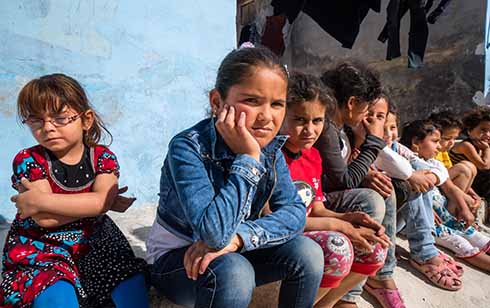 Many international days remind us of what ordinary people suffer in crises: war, famine, discrimination or disease. For that reason, the naming of new days is a mixed blessing.
Many international days remind us of what ordinary people suffer in crises: war, famine, discrimination or disease. For that reason, the naming of new days is a mixed blessing.
It makes us think of people in great need. But it also makes us aware of the tragic reasons why that need exists. That is also true of the Day to Protect Education from Attack, which is celebrated for the first time this year on 9 September.
The day reminds us that armed conflict destroys or strips of possibilities they would otherwise have. We are horrified to hear of school children being killed, and we are outraged that schools are being targeted by terrorists or military planes. But we may miss the way in which the consequences of military conflict ripple out into people’s lives when civilians are regarded as legitimate targets.
When towns are threatened the ordinary services necessary for decent living are interrupted. Children can no longer go to school. If the towns are bombed and shelled civilians often flee and become refugees, looking desperately for shelter in their own nation or outside it. They may be placed in camps, which themselves are insecure and lawless. They are preoccupied with saving their lives, finding enough food to survive, dealing with the trauma they have suffered, and wondering where they will next have to move.
STABILITY IMPORTANT
In these situations, education becomes impossible. For education some measure of stability is needed. Where there is schooling, it is usually basic. Communities lack even the reading and writing materials basic for any education. As a result, children can grow into young men and women who have no future in the rural life from which their parents came, but lack access to the skills and knowledge they will need to live in modern cities.
The International Day to Protect Education invites us to remember the heroic work of volunteers who help local people to educate their children, providing resources to enable people to learn. Their work demands creativity and resilience to start again when military action again scatters the people.
This day encourages those who live in safe and prosperous societies to take notice of what is happening to the lives of ordinary people as a result of the conflicts in which their own nations have a part. This participation is sometimes through sending troops into a nation that does not threaten their own security, through arming proxy groups in other nations, and by selling arms that maim, kill and destroy the lives and future of women men and children.
BRING ABOUT CHANGE
Noticing can help bring about change. When we notice people like ourselves forced to live in fear, attacked and displaced, and their children robbed of education and of possibility, we might then be outraged and led to question the actions of our governments in supporting military conflicts and selling arms. We might demand that armed groups which we support make peace and not war. We might also insist that our governments support the people displaced in these conflicts in finding a safe home, and help to rebuild the homes and educational services that are central to decent human living.
The International Day to Protect Education from Attack is not just about actions taken in far-off nations. It speaks powerfully also to our own responsibilities.